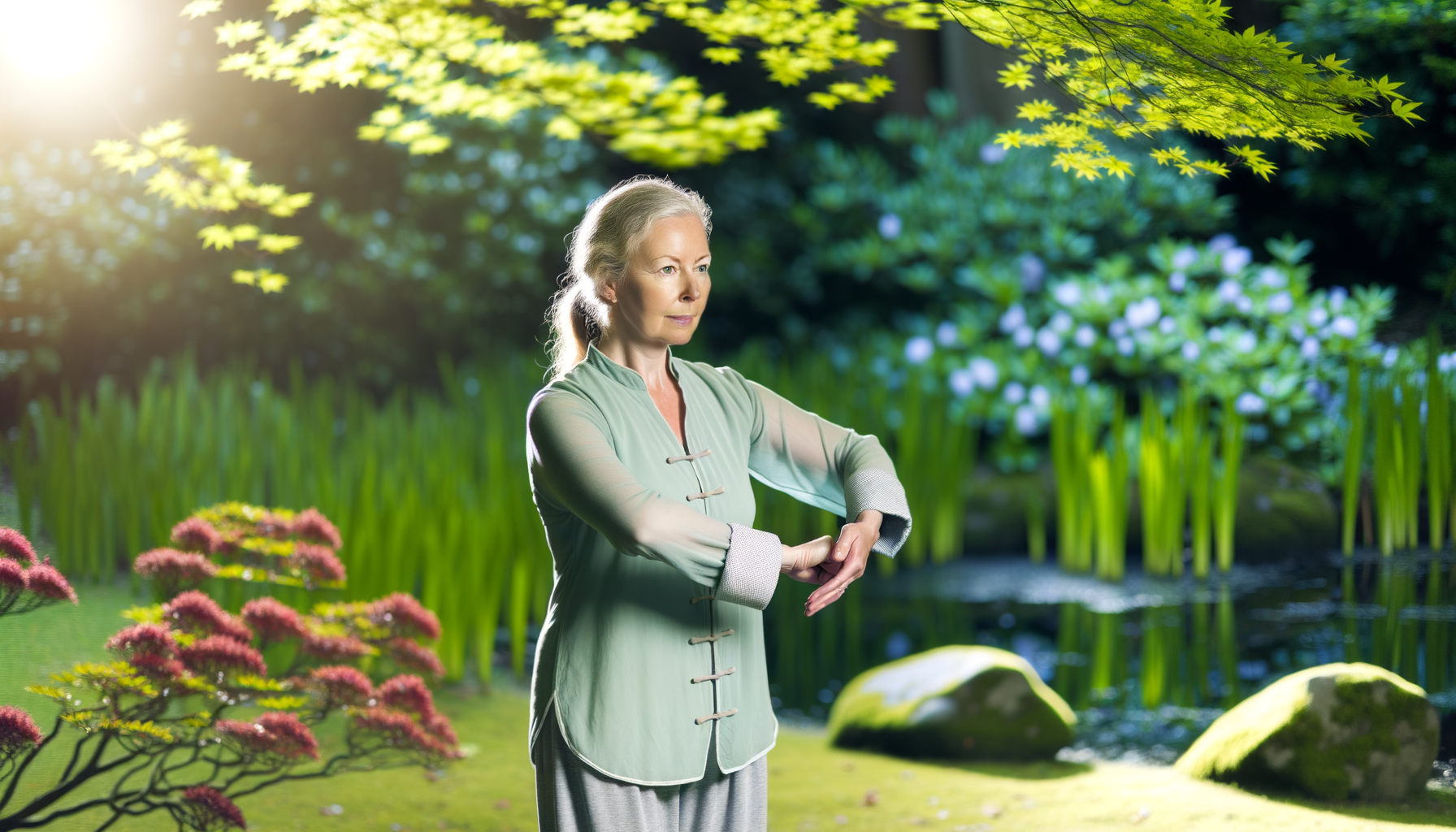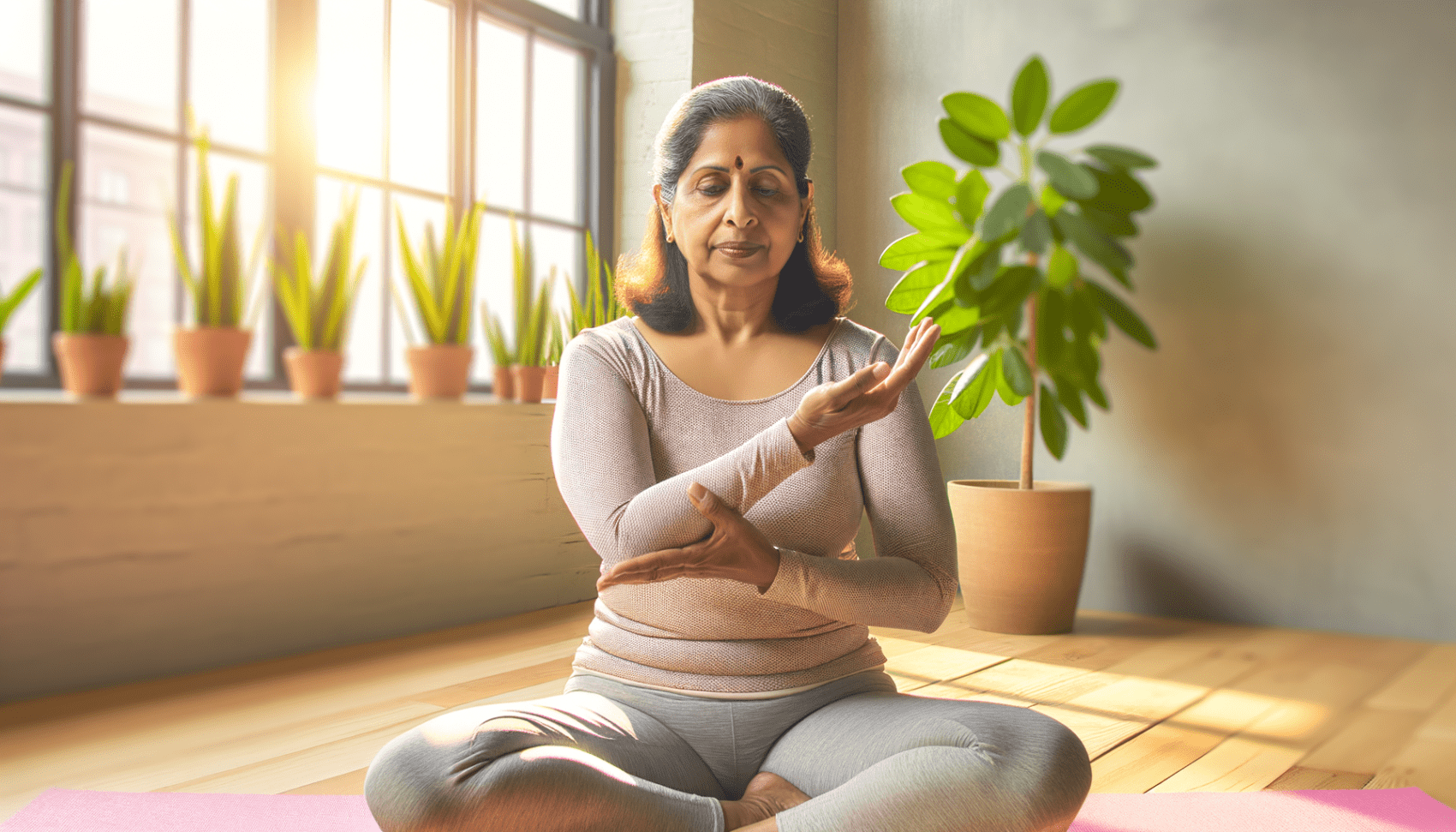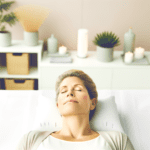Menopause is a natural biological process that marks the end of a woman’s reproductive years. While the average age of onset is around 51, the experience of menopause can vary widely among individuals. Some women transition through menopause with minimal discomfort, while others may face a range of symptoms that can significantly impact their quality of life. These symptoms are often a result of hormonal shifts in the endocrine system, leading to sleep disturbances, changes in the vaginal and urinary tracts, and emotional swings. Hot flashes and night sweats are common, affecting approximately 75 percent of women. Additionally, menopause can bring about changes in bone density, such as osteoporosis, due to a drop in estrogen levels.
Overview of Qigong as a Meditative Movement Practice
Qigong is an ancient Chinese practice that combines meditative focus with physical movement to balance and cultivate ‘qi’ or life energy within the body. This holistic approach to health and well-being involves gentle, flowing movements, deep breathing, and mental concentration. Qigong is rooted in traditional Chinese medicine, martial arts, and philosophy, and is designed to improve physical, emotional, and spiritual health. It is accessible to people of all ages and fitness levels and can be practiced both as a form of therapeutic exercise and as a path to personal growth and spiritual development.
The Connection Between Qigong and Menopausal Symptom Management
Emerging research and anecdotal evidence suggest that Qigong may be an effective tool for managing menopausal symptoms. The practice’s emphasis on mind-body integration can help alleviate the frequency and intensity of hot flashes, improve sleep and mood disturbances, and reduce stress. Qigong’s gentle movements can also support muscle and joint health, which may be particularly beneficial during the menopausal transition. By fostering a deeper sense of relaxation and inner balance, Qigong offers a non-pharmacological approach to menopause management, aligning with the body’s natural processes and promoting overall well-being.
Menopausal Symptoms and Conventional Treatments
Common Symptoms Experienced During Menopause
Menopause is a natural biological process that marks the end of a woman’s reproductive years. However, the transition can bring a variety of symptoms due to hormonal shifts within the endocrine system. Common symptoms include sleep problems, vaginal and urinary tract changes, and emotional swings. According to the National Institute on Aging, as many as 75 percent of women experience hot flashes and night sweats. The Journal of the North American Menopause Society also reports that changes in bone density, such as osteoporosis, are linked to the drop in estrogen levels during menopause.
Hormone Replacement Therapy
Hormone Replacement Therapy (HRT) is a common treatment for menopausal symptoms, offering relief through pills, gels, creams, patches, and rings that contain estrogen and, sometimes, progesterone. Despite its effectiveness in alleviating menopausal discomfort, depending on which form of HRT is used, HRT may not be without side effects. Some women may experience bloating, breast tenderness, headaches, mood changes, and nausea as dosage may have to be adjusted. Research from the National Institutes of Health suggests that for some women, these side effects may outweigh the benefits of HRT.
Limitations of Modern Medicine in Treating Menopause
Modern medicine often focuses on treating the symptoms of menopause rather than the holistic experience of the transition. While HRT can be effective, it does not suit all women due to its side effects and potential risks. The National Center for Complementary and Integrative Health, a division of the National Institutes of Health, acknowledges that “mind and body practices such as yoga, tai chi, qigong, and acupuncture may help reduce the severity of menopausal symptoms”. These include the frequency and intensity of hot flashes, sleep and mood disturbances, stress, and muscle and joint pain. This suggests a growing recognition of the limitations of conventional treatments and the potential benefits of integrating alternative approaches like Qigong into menopause management.

If you wonder, if this discomfort and the dryness down there will be there forever….
Try Mae. Mae is gives you back comfort, control, re-assurance, and re-connecting.
Mae is more than just a vaginal moisturizer; it’s your ally for intimate natural health, rediscovering joy, cultivating comfort, and even igniting sparks of intimacy and rekindled romance. Mae is your companion in rejoicing in your femininity at every stage of life. Learn more…
Qigong: An Ancient Practice for Modern Ailments
The Principles of Qigong and Its Relevance to Women’s Health
Qigong, an ancient Chinese meditative practice, is rooted in the traditional philosophy of balancing the body’s vital energy, or “qi.” This practice involves a combination of movements, breathing techniques, and mental focus to promote overall wellness. For women, particularly those navigating the complexities of menopause, Qigong offers a holistic approach to managing health. It aligns with the body’s natural rhythms, supporting the transition through various life stages, and addresses both physical and emotional well-being.
Qigong’s Role in Balancing Hormones and Reducing Stress
Menopause is characterized by significant hormonal changes that can lead to a variety of symptoms, from hot flashes to mood swings. Qigong’s gentle movements help to stimulate and balance the endocrine system, which is responsible for hormone production. By promoting relaxation and reducing stress, Qigong can mitigate the intensity of menopausal symptoms. The practice encourages deep breathing and mindfulness, which have been shown to lower cortisol levels, the body’s primary stress hormone, thereby fostering a sense of calm and reducing the physiological impact of stress.
Comparative Analysis of Qigong and Western Medical Approaches
While Western medicine often addresses menopause with hormone replacement therapy (HRT), this approach can carry risks and side effects. Qigong, on the other hand, offers a non-invasive alternative that supports the body’s natural healing capabilities. Unlike HRT, Qigong does not introduce external substances into the body, but rather works to enhance internal balance and strength. It is a practice that can be sustained throughout life, providing ongoing benefits without the complications associated with long-term medication use.
In summary, Qigong’s principles of energy cultivation and balance are particularly relevant to women’s health during menopause. Its role in balancing hormones and reducing stress offers a natural and holistic approach to symptom management. When compared to Western medical treatments, Qigong presents a safe and effective alternative or complement to traditional therapies, empowering women to take an active role in their health and well-being.

THEN IT CONTAINS TOXIC CHEMICALS. WHY RISK IT GETTING SICK? GO CHEMICAL FREE.
Scientific Evidence Supporting Qigong for Menopause
Review of Research on Qigong and Tai Chi
Recent studies have increasingly focused on the benefits of Qigong and Tai Chi for managing menopausal symptoms. A randomized clinical trial involving 125 postmenopausal women demonstrated that a 12-week Qigong exercise program significantly improved menopausal symptoms and health-related quality of life (HRQoL). The participants experienced improvements in somatic, psychological, and urogenital levels, as well as in general health, vitality, and mental health domains of the SF-36 survey. This suggests that Qigong could be a valuable non-pharmacological intervention for menopause management.
Harvard Medical School Studies on Tai Chi and Bone Density
Research from Harvard Medical School supports the efficacy of Tai Chi, a form of Qigong, in maintaining bone density in postmenopausal women. Studies indicate that Tai Chi, when combined with standard treatments, can help mitigate the bone density loss associated with menopause. This is particularly relevant given the increased risk of osteoporosis during the postmenopausal period. The gentle, weight-bearing nature of Tai Chi exercises appears to be a key factor in promoting bone health and preventing osteoporosis.
The Safety and Effectiveness of Qigong
The safety profile of Qigong is one of its most appealing aspects. Unlike many pharmacological treatments that come with a risk of side effects, Qigong is a low-impact, safe practice suitable for individuals of varying fitness levels and health statuses. Its effectiveness extends beyond physical symptoms, addressing psychological well-being and sleep quality, which are often disrupted during menopause. A randomized controlled trial focusing on mental health and sleep quality in postmenopausal women found that Qigong significantly improved sleep quality, anxiety, and depression. These findings underscore Qigong’s potential as a holistic approach to managing the multifaceted challenges of menopause.
In conclusion, the body of scientific evidence points to Qigong and Tai Chi as effective practices for alleviating menopausal symptoms, improving bone density, and enhancing overall well-being. Their safety and effectiveness make them suitable for integration into self-care routines for menopausal women seeking a natural and integrative approach to symptom management.
Personal Testimonies and Expert Insights
Case Studies: Women’s Experiences with Qigong
Menopause is a transformative period in a woman’s life, often marked by a range of physical and psychological symptoms. While hormone replacement therapy (HRT) has been a conventional treatment, its controversy have led many women to seek alternative approaches. Qigong, a traditional Chinese meditative movement practice, has emerged as a supportive therapy for managing menopausal symptoms. Personal testimonies from women who have incorporated Qigong into their lives during menopause highlight its potential benefits.
Example 1: Jane, a 52-year-old woman, reported experiencing frequent hot flashes and night sweats that disrupted her sleep and daily activities. After practicing Qigong for six months, she noticed a significant reduction in the frequency and intensity of her hot flashes. Moreover, her sleep quality improved, and she felt a newfound sense of calm and mental clarity.
Example 2: Maria, aged 49, struggled with mood swings and anxiety during her perimenopausal phase. She turned to Qigong as a non-pharmacological option to manage her psychological symptoms. Maria found that the rhythmic breathing and gentle movements of Qigong helped stabilize her mood and alleviate anxiety, contributing to an overall improvement in her quality of life.
These case studies suggest that Qigong may offer a safe and effective alternative for women seeking relief from menopausal symptoms, particularly when HRT is not an option or preference.
Expert Opinions on Qigong for Menopausal Symptom Relief
Healthcare professionals and researchers have begun to recognize the value of Qigong in the context of menopause management. Experts in women’s health and integrative medicine have observed that Qigong’s emphasis on mind-body connection can be particularly beneficial for addressing the multifaceted nature of menopausal symptoms.
Research conducted by the North American Menopause Society suggests that mind-body practices, including Qigong, can improve health-related quality of life (HRQoL) and assist in managing conditions such as anxiety and sleep disturbances, which are often exacerbated during menopause.
Furthermore, a systematic review by Harvard Medical School highlighted the potential of Tai Chi, a practice similar to Qigong, in improving bone density among postmenopausal women, suggesting that Qigong may also offer this benefit due to its comparable physical components.
In conclusion, personal testimonies and expert insights converge on the potential of Qigong as a valuable practice for managing menopausal symptoms. Its non-invasive nature and adaptability make it an appealing option for many women seeking holistic and integrative approaches to health during this pivotal life stage.
Do you know the three main ways that your body gets in touch with harmful chemicals with everyday products? Knowledge is Power!
The Ultimate Detox Guide will tell you how to lower your exposure to harmful chemicals!

Incorporating Qigong into Self-Care Routines
How to Begin Practicing Qigong
Embarking on a Qigong journey starts with understanding the practice’s essence and finding a suitable learning method. Qigong, a meditative movement practice rooted in Traditional Chinese Medicine, is designed to balance and harmonize the body’s vital energy, known as Qi. To begin, seek out a qualified instructor or program that resonates with your needs. Many find starting with online resources or local classes beneficial. It’s essential to create a calm, comfortable space for practice, wear loose-fitting clothing, and approach each session with an open mind and patience.
Qigong Exercises Suitable for Menopausal Women
- Abdominal Breathing: This foundational Qigong exercise promotes relaxation and stress reduction, which can alleviate menopausal symptoms like anxiety and sleep disturbances.
- Ovary Massage: A gentle self-massage technique that can help with cramps, dryness, and hormonal balance.
- Healing Sounds: Using specific sounds to vibrate and release tension from the body’s organs, particularly beneficial for managing emotional fluctuations during menopause.
Creating a Sustainable Qigong Practice
To ensure the longevity of your Qigong practice, consistency is key. Start with short, daily sessions, gradually increasing the duration as your comfort with the movements grows. Integrating Qigong into your daily routine, perhaps in the morning or before bedtime, can help establish a rhythm. It’s also important to listen to your body and modify exercises as needed. Remember, the goal is not perfection but rather cultivating a sense of well-being and balance. Over time, your Qigong practice can become an invaluable part of your self-care, offering a natural and empowering way to manage menopause symptoms.
By incorporating Qigong into your self-care routine, you can harness the practice’s gentle power to navigate the transitions of menopause with grace and vitality.
By the way, something for you, a little gift!!!
I am just in the middle of publishing my book. It’s about How women can balance their hormones. One part is about food and diet, of course.
Follow this link and enter your email.
I will send you this part of the book for free once the book is published. It has many concrete, practical tips and recipes and will help you feel better during menopause or times of Big hormonal fluctuations.
Annette, Damiva Lead for Health & Wellness

Conclusion: Embracing Qigong for Holistic Menopause Management
Summarizing the Benefits of Qigong for Menopause
Throughout this exploration of Qigong as a supportive practice for managing menopause, we have uncovered a multitude of benefits. Qigong, with its gentle movements, deep breathing, and meditative focus, offers a non-invasive, empowering approach to alleviate menopausal symptoms. Women have reported experiencing reduced hot flashes, improved sleep patterns, and a decrease in stress and anxiety levels. The practice encourages a harmonious balance of hormones and supports overall well-being. By directing Qi, or life energy, to areas of the body that need healing, Qigong serves as a tool for women to regain a sense of control and comfort during this transitional phase of life.
The Future of Integrative Approaches to Menopause
The future of menopause management is bright with the integration of practices like Qigong into conventional treatment plans. As research continues to validate the efficacy of such holistic approaches, we anticipate a more widespread acceptance and utilization of Qigong alongside other treatments. The potential for personalized care routines that blend the wisdom of ancient practices with modern science holds promise for a new era of empowered health management for menopausal women.
Final Thoughts on Mind-Body Connection and Women’s Health
The journey through menopause is as much a mental and emotional process as it is physical. The mind-body connection is a powerful aspect of women’s health that Qigong nurtures with every controlled breath and mindful movement. By embracing Qigong, women can tap into their inner strength and wisdom, fostering resilience and vitality. As we look to the future, let us continue to advocate for and support integrative practices that honor this connection, ensuring that women can approach menopause not just with the aim of managing symptoms, but with the intention of thriving in all aspects of health and life.










